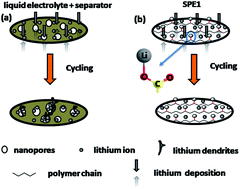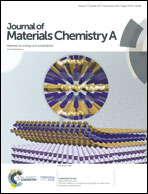A lithium carboxylate grafted dendrite-free polymer electrolyte for an all-solid-state lithium-ion battery†
Abstract
A novel solid polymer electrolyte (SPE) was synthesized by a two-step polymerization process followed by mixing with solid lithium bis(trifluoromethane sulfonimide) (LiTFSI) salts, composed of hybrid copolymer matrices grafted with lithium carboxylate branched chains. The target SPE1 was based on the copolymer matrix grafted with a lithium-based precursor of LiDMPA, which was prepared by the reaction between dimethylol propionic acid (DMPA) and LiOH. The results showed that SPE1 had an ionic conductivity of 0.1 mS cm−1 at 25 °C, and displayed an electrochemical stability window up to 5.0 V (vs. Li+/Li) at a temperature of 60 °C. The grafting of LiDMPA onto the copolymer gave the SPE1 electrolyte a special structure to ensure a homogeneous current distribution and Li ion deposition, which successfully inhibited Li dendrite growth. As a result, an all-solid-state LiFePO4/SPE1/Li battery was assembled and it presents better electrochemical performance with a high capacity retention of 98.8% at 0.2C with 127.3 mA h g−1 after 100 cycles at 60 °C, and delivers capacities of 161.1, 86.7 and 54.5 mA h g−1 at temperatures of 80, 40 and 25 °C, respectively. This work provides a promising route to fabricate dendrite-free solid polymer electrolytes for all-solid-state lithium-ion batteries.

- This article is part of the themed collection: 2019 Journal of Materials Chemistry A HOT Papers


 Please wait while we load your content...
Please wait while we load your content...